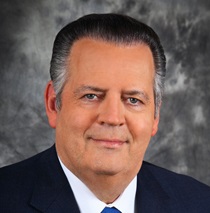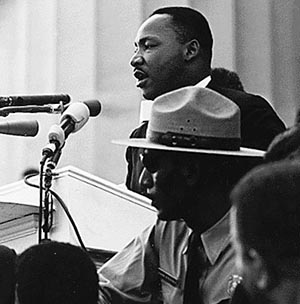By Bob Allen
The former ethics spokesman for the Southern Baptist Convention says visceral reaction to decisions by grand juries in Ferguson, Mo., and Staten Island, N.Y., not to indict police officers in the deaths of two unarmed African-American males shows America has a long way to go before achieving Martin Luther King Jr.’s dream of a nation where people are not judged “by the color of their skin but by the content of their character.”
 Richard Land, who retired in 2013 after 25 years as head of the SBC Ethics and Religious Liberty Commission, said in a Christian Post commentary Dec. 11 that the different way that blacks and whites tend to view those incidents reveals “we still have a serious rift in the nation’s social fabric.”
Richard Land, who retired in 2013 after 25 years as head of the SBC Ethics and Religious Liberty Commission, said in a Christian Post commentary Dec. 11 that the different way that blacks and whites tend to view those incidents reveals “we still have a serious rift in the nation’s social fabric.”
Land, who now is president of Southern Evangelical Seminary in Matthews, N.C., said Christians should lead the effort to “exorcize the ghosts of the past” about America’s shoddy treatment of non-whites.
“There are always the ghosts of the racist past among us, coloring how we perceive the present,” Land said. “Our present is always informed and tinted by our past experiences. Consequently, while most white Americans were dismissive of theories that the police framed O. J. Simpson, many African-Americans, based on their past experiences, found such accusations far too believable.”
While he has never had a negative experience with a police officer of any race, Land said he knows few African-Americans who have not. Land said the only way to heal the racial rift is for Christians “to come forward and take the lead in the immediate formation of ethnically diverse coalitions where people can tell each other their stories and begin to exorcise the ghosts of the past together.”
“Ultimately, we must seek to get out of our comfort zones and strive with intentionality to form truly multi-ethnic, multi-class churches where people of differing ethnicities and socio-economic backgrounds worship together and minister to one another as equal members of the local body of Christ,” Land said. “Then we will hear and know each other’s stories, and we will put faces we know on racial and economic injustice. Such churches will truly transform our culture.”
Land, best known for aligning Southern Baptists’ public policy agency with the Religious Right during the 1990s, identified racial reconciliation as a major goal when he interviewed for the job as executive director of what was then called the Christian Life Commission in 1988.
 At his very first meeting, a member of the commission sparked controversy with comments labeling Martin Luther King a fraud and opining that apartheid in South Africa was beneficial because it meant separate development. Nobody responded to the unsolicited comments during the meeting, but Land said afterward he believed it was because all the other commissioners were grieved and embarrassed.
At his very first meeting, a member of the commission sparked controversy with comments labeling Martin Luther King a fraud and opining that apartheid in South Africa was beneficial because it meant separate development. Nobody responded to the unsolicited comments during the meeting, but Land said afterward he believed it was because all the other commissioners were grieved and embarrassed.
The first conference held under Land’s administration was on racial reconciliation, and he took the lead in passage of a Southern Baptist Convention resolution adopted on the convention’s 150th anniversary in 2005 apologizing to African-Americans and pledging “to eradicate racism in all its forms from Southern Baptist life and ministry.”
Those efforts were tarnished on March 31, 2012, when Land said on his radio talk show that President Obama was using the shooting of teenager Trayvon Martin in Sanford, Fla., to “gin up the black” vote for his re-election and labeling African-American activists Jesse Jackson and Al Sharpton as “racial ambulance chasers” and “race hustlers” who have “made their careers and lucrative fortunes by fomenting racial grievance and demonizing the ‘white power structure.’”
“In their eyes segregation has never been truly repealed, it’s just become invisible,” Land said. “They need the Trayvon Martins to continue perpetuating their central myth — America is a racist and an evil nation. For them it’s always Selma, Alabama, circa 1965. They haven’t noticed that the nation has changed.”
Land said those using race to polarize the electorate are “playing with fire, and people are going to get hurt.”
“This situation is getting out of hand,” Land said. “There is going to be violence. When there is violence it’s going to be Jesse Jackson’s fault. It’s going to be Al Sharpton’s fault. It’s going to be Louis Farrakhan’s fault, and to a certain degree it’s going to be President Obama’s fault.”
Land received a reprimand from his board of trustees for “hurtful, irresponsible and racially charged words” that angered black leaders in the denomination. He later apologized but soon after announced his retirement date more than a year in advance.
In his Christian Post commentary, Land said a few months after he felt called to full-time ministry at age 16, he was inspired by watching Martin Luther King’s “I Have a Dream” speech on television.
“I was captivated, convicted and convinced,” he recalled. “From that moment forward it was never enough to be opposed to racism and segregation (as I already was). I must confront it, speak out against it, and seek to be a Christian ambassador of reconciliation in my ministry.”
“I have dedicated a significant portion of my ministry in the little over a half-century since that summer day long ago,” Land said. “I remain undaunted. I remain optimistic. I refuse to abandon Dr. King’s vision. With Jesus’ help we will finish the journey together, black and white, brothers in Christ leading the way.”
Previous stories:
Richard Land announces retirement
SBC leader issues apologies for comments
Pastor says SBC should repudiate and/or replace Richard Land
